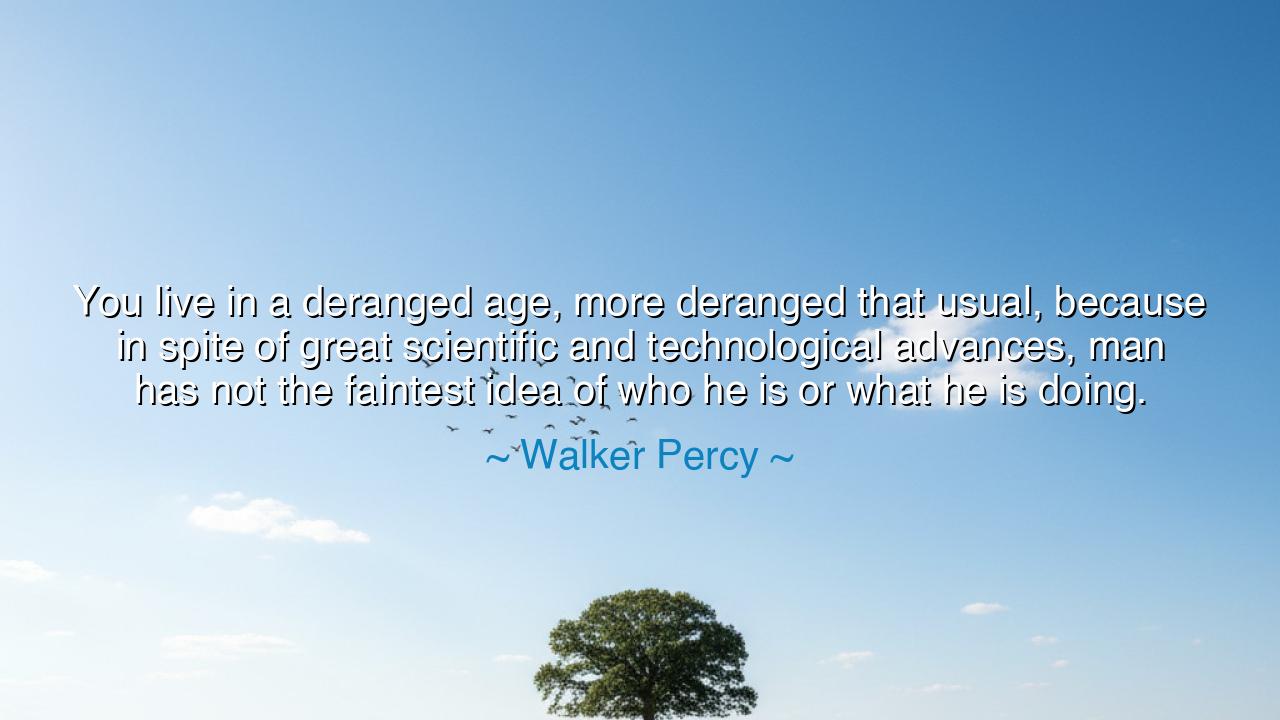
You live in a deranged age, more deranged that usual, because in
You live in a deranged age, more deranged that usual, because in spite of great scientific and technological advances, man has not the faintest idea of who he is or what he is doing.






In the tumultuous sea of time, where humanity rides the waves of progress and decay, there is a profound question that echoes through the ages: Who are we? What are we doing here? Walker Percy, in his reflection, offers a stark and sobering truth: "You live in a deranged age, more deranged than usual, because in spite of great scientific and technological advances, man has not the faintest idea of who he is or what he is doing." These words strike at the heart of the modern condition, where, despite the dazzling strides made in knowledge and innovation, humanity remains as lost as ever in the search for meaning and purpose. The more we know about the world around us, the more distant we seem from understanding our own place within it.
In the ancient world, the question of identity was paramount. The Greeks, those brilliant seekers of wisdom, were not concerned merely with the what of existence, but the why. Socrates, one of the most profound of philosophers, famously declared, "Know thyself," underscoring the belief that true wisdom begins with self-awareness. The ancients understood that the pursuit of knowledge and truth was not just about mastering the external world, but about understanding the internal world—the mind, the soul, and the nature of existence itself. In contrast, Percy’s words suggest that we have advanced in science and technology, yet we have become disconnected from the very essence of what it means to be human. We may know how to reach the stars, but we struggle to understand the meaning of our own lives.
Consider the story of Icarus, the young man who sought to defy nature with wings of wax and feathers. In his hubris, he flew too close to the sun, melting his wings and plummeting to his demise. The myth of Icarus is a warning against the dangers of overreaching, of pursuing knowledge and progress without understanding the limits of our nature. While Icarus sought mastery over nature, he lacked the wisdom to understand the deeper forces at work within himself and the world. His flight, though a remarkable achievement of technology, was doomed by his ignorance of the self. This ancient story resonates with Percy’s reflection on the modern world—technological advances abound, but without a corresponding understanding of who we are and what we are truly seeking, we risk flying too close to the sun.
In our modern era, the advances in science and technology have brought us closer to the answers to many practical questions. We have mapped the human genome, walked on the moon, and unlocked the deepest secrets of the cosmos. Yet, in our pursuit of knowledge, we have not answered the most fundamental of human questions: Who are we? What is the purpose of our existence? Why do we struggle, suffer, and seek meaning in a world that often feels indifferent to our desires? This is the derangement Percy speaks of—an age where, despite our extraordinary accomplishments, we remain ignorant of the most essential aspects of our being.
Consider the great story of Albert Einstein, whose breakthroughs in physics revolutionized our understanding of the universe. Yet, despite his monumental achievements, Einstein remained deeply introspective about the meaning of life. He once said, "The most beautiful thing we can experience is the mysterious. It is the source of all true art and science." Einstein's insight reveals the paradox of modern existence: while we may be able to explain the mechanisms of the universe, we still struggle with the mystery of our own existence. He sought to understand the cosmos, but he also understood that there were questions that science alone could not answer. Percy’s words remind us that we have built a world filled with technological marvels, yet we are still searching for the answers to questions that transcend science—questions of the soul, purpose, and meaning.
The lesson that Walker Percy offers is both profound and urgent: knowledge without wisdom is a dangerous thing. In our race to conquer the external world, we must not forget to reconnect with the internal world. True progress is not just in the mastery of technology, but in the depth of understanding we have about ourselves, about our place in the world, and about the forces that drive us. The ancients knew that wisdom came not just from knowing more, but from knowing who we are and how we relate to the world around us. In the modern age, we must heed this ancient wisdom—the more we learn, the more we must understand our own hearts and minds, for without this balance, we risk being deranged by the very advancements that should have set us free.
Practical action calls us to reclaim the search for meaning and self-awareness in our lives. As we advance in knowledge and technology, we must also strive to deepen our understanding of the human condition. Take time for reflection, meditation, and dialogue—seek to understand not only the world but your place within it. Engage with the mysteries of life, recognizing that some questions cannot be answered by science alone, but must be approached with humility and wisdom. Let us use our advancements not just to conquer the world around us, but to enrich the world within us, for it is through this balance that we can hope to find the true purpose of our existence.






AAdministratorAdministrator
Welcome, honored guests. Please leave a comment, we will respond soon